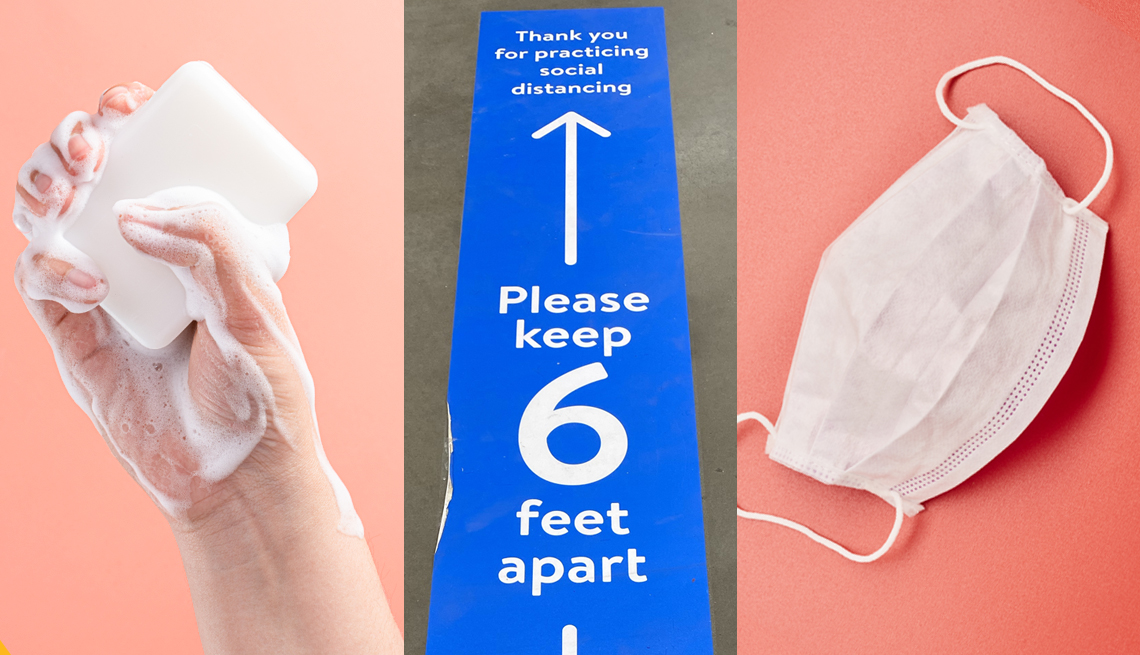
25 tips for reducing your risk of contracting covid-19
- Select a language for the TTS:
- UK English Female
- UK English Male
- US English Female
- US English Male
- Australian Female
- Australian Male
- Language selected: (auto detect) - EN
Play all audios:

AT HOME 9. SANITIZE SURFACES. Get in the habit of routinely cleaning “high-touch” surfaces such as tables, toilets and doorknobs. (FYI: Proper cleaning requires a wipe-down with soap and
water before using disinfectant.) Cleaning is particularly important after a caregiver, family member or another guest has been inside your home. 10. KEEP PETS SOCIALLY DISTANCED, TOO.
Sorry, Fido. According to the CDC, pets are considered part of your household — meaning they shouldn't interact with people outside of it, or with any family members who become sick.
(While a small number of pets have tested positive for the virus that causes COVID-19, the risk of transmission from pets to people is thought to be low). 11. LIMIT GATHERINGS. Move the
party outside! The CDC recommends hosting social gatherings outdoors whenever possible and adhering to social distancing guidelines. If you must be inside, make sure the space is well
ventilated. Regardless of location, encourage guests to bring their own food and beverages. Any guest who feels ill, or who has been in contact with someone with COVID-19, should not attend.
RECREATION AND SOCIAL ACTIVITIES 12. EMBRACE THE GREAT OUTDOORS. A day at the beach or a park is likely a safer option than gathering inside someone's home or at an indoor venue.
Remember to keep your distance from others, even in outdoor spaces, and to wear a face covering when maintaining 6 feet of distance isn't possible. 13. TRY ONLINE ACTIVITIES. In-person
hobbies — from choir practice to book clubs — are going digital, thanks to videoconferencing platforms like Zoom. If you were previously part of a club or group that is no longer meeting in
person, consider finding a virtual alternative, or ask your group leader about the possibility of moving meetings online. 14. DINE SMART. Restaurants in certain states have returned to
serving patrons indoors or at outside tables. The CDC recommends opting for outdoor seating with 6 feet of space between tables whenever possible. Takeout and delivery are also options for
those tired of home cooking — and experts say the risk of contracting COVID-19 from either food or food packaging is low. 15. PUT A PAUSE ON SHARING. Normally, sharing during a social outing
— whether it's sunscreen, towels or cooler storage space — is a sign of goodwill. Not so during a pandemic — not even at the swimming pool. “One can sort of say, ‘Well, it's been
in chlorinated water.’ But I would just make sure that we get into the habit of what's mine is mine,” says Boris Lushniak, M.D., dean of the University of Maryland School of Public
Health and former acting and deputy U.S. surgeon general. “The whole issue of sharing things should become passé in the near future, at least." 16. AVOID HANDSHAKES AND HUGS. Greetings
and goodbyes can be tricky at a time when avoiding close contact is key to staying safe. Etiquette expert Myka Meier recommends alternatives to traditional gestures — including a simple nod
to say “hello.” TRAVEL 17. BE AWARE OF ADVISORIES. You may face restrictions (like a mandatory 14-day quarantine period upon entering certain states) when traveling domestically. Other forms
of travel are discouraged by the CDC, including international travel and all cruises, including river cruises. Taking a plane? Get familiar with new Transportation Security Administration
(TSA) screening procedures before you arrive at the airport.
